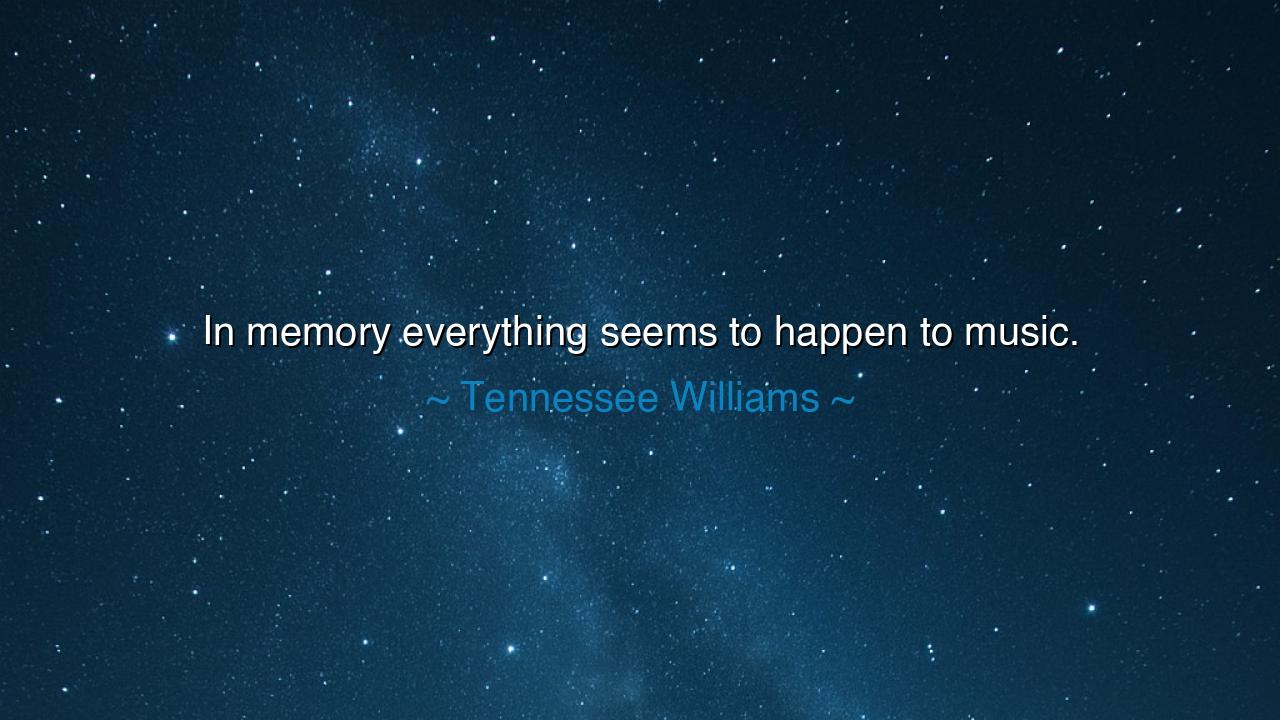
In memory everything seems to happen to music.






Hear, O keepers of wisdom, the words of Tennessee Williams: “In memory everything seems to happen to music.” At first, these words may sound like a poet’s fancy, a gentle metaphor for nostalgia. But when heard deeply, they reveal the mysterious union between remembrance and art, between the past and the melodies that linger within us. For in truth, the human heart does not recall life as a cold sequence of events; it recalls it as song. And every joy, every sorrow, every turning of fate is remembered with a rhythm, a harmony, a tune that lifts it beyond mere fact into living music.
Williams himself, a dramatist of deep soul, knew the power of memory. His plays, like The Glass Menagerie, are filled with recollections, scenes of longing that unfold not as rigid history, but as dreamlike melodies. In his own life, marked by struggle and heartache, music became the voice of what could not be spoken plainly. When he said that all things in memory are accompanied by music, he meant that memory is not a silent archive but a living symphony—where the smallest details are heightened, softened, transformed into something greater than the moment itself.
The ancients understood this. Among the Greeks, the goddess Mnemosyne, spirit of memory, was the mother of the Muses—the very sources of poetry, song, and story. From her womb came music itself, because the ancients knew what Williams would later proclaim: that the act of remembering transforms experience into art. Thus, memory does not simply preserve—it composes. It weaves rhythm around life, adding meaning where there was once only time.
Consider a story from history: when Beethoven, nearly deaf, wrote his Ninth Symphony, he reached not into the sounds of the present, which he could no longer hear, but into the memory of music that still lived within him. His triumph was not merely notes on a page but the translation of remembered beauty into eternal art. And so, when we recall our own lives, we too hear the faint echoes of such symphonies—childhood laughter becomes melody, heartbreak becomes lament, victory becomes anthem.
Williams’s words remind us that the soul seeks to elevate memory. We do not remember the rain as mere drops, but as the sound of a gentle song against the roof. We do not recall a farewell as only silence, but as a dirge that lingers. Music is the companion of memory because memory itself is emotional, not mechanical. It shapes the past into something the heart can bear, cherish, and carry forward.
The lesson is profound: cherish the music in your memories. Do not dismiss them as fantasies or exaggerations, for in their rhythm lies the meaning of your life. Let the joyous ones strengthen you, let the sorrowful ones teach you, and let them all sing together as your personal symphony. Each memory has its tune—learn to hear it, and you will walk in deeper harmony with your own past.
Practical action follows: when you recall your days, do so not with cold analysis, but with the ears of a listener. Ask: what is the song of this moment? Was it triumph? Was it lament? Was it a lullaby of peace or a march of struggle? Then carry these songs into your present, allowing them to guide and inspire you. Write them down, speak them, or even play them on an instrument. In this way, you honor both memory and life, and you will find that your journey is not fragmented, but woven into a great composition.
So let these words be inscribed in your heart: “In memory everything seems to happen to music.” For life is not only lived—it is remembered. And in remembering, we become composers of our own story. Let your memories be not chains of regret, but notes of a song that carries you forward. Thus shall your days, past and present, resound like a symphony written by time itself.






AAdministratorAdministrator
Welcome, honored guests. Please leave a comment, we will respond soon